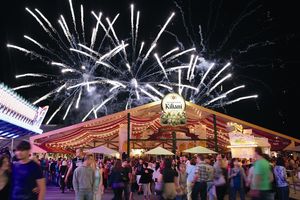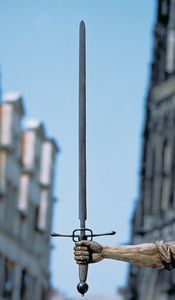Tracing festivals and the traditional German Volksfest
Historic Highlights of Germany celebrate 2015 with beloved traditions
Trier (pts007/30.12.2014/15:00) The cities of the Historic Highlights of Germany have preserved their customs and traditions as well as their "Volksfeste" whose characters are often closely connected to the history of the respective cities. Festivals are a year-round way of life in Germany. There are outdoor markets at Christmas time, and they only have to set up a ladder once after Christmas, using it both to take down the greenery and hang the coloured streamers for the Carnival season. During a visit to Germany, a trip to a "Volksfest" should definitely be part of the travel itinerary, the perfect time for this is the summer season from March to October.
"One of the oldest records referring to the existence of the famous "Thüringer Bratwurst" (Thuringian bratwurst) can be traced back to the year 1404. It is not surprising that the Thuringian capital Erfurt uses this as an occasion to celebrate the bratwurst," said Bjoern Rudek, CEO of Historic Highlights of Germany. Every year in March the "Thüringer Bratwurstfest" (Thuringian Bratwurst Festival) - a big barbecue to welcome the new summer season - transforms Erfurt's cathedral square into probably Germany's largest barbecue area. 20 barbecue grids are glowing while friends and manufacturers of the Thuringian bratwurst present their skills. One attraction for the adventurous among all visitors is the bratwurst-rodeo!
German Beer Festivals that rival Oktoberfest
Some fairs even go further back in history, such as the Send in Münster , the Plärrer in Augsburg or the Dult in Regensburg. The name "Send" is a derivation of the German word "Synode" (Engl. 'synod'), the meeting of clergymen and senior representatives of the diocese in Münster which has been held twice a year since the 9th century. On this occasion, a market has been held since the the 11th century which differed from the regular weekly market for townspeople and lifted sales restrictions or privileges for local merchants and craftsmen. Since 1578, the so-called "Sendschwert" (lit. Send Sword) has been hung out at the Town Hall in Münster, a reminder that any unruly behavior at the fair used to be punishable.
In Augsburg, the existence of a fun fair can be traced back to the year 967. Originally, the "Osterdult" was a cloth market which continued to develop over the centuries and offers all sorts of goods for sale. The "Dult" is accompanied by the "Plärrer", another fun fair with amusements and rides, whose name derives from the "Geplärre" (German for 'blubbering') of the visitors. In his poem "Das Plärrerlied" (lit. The Plärrer Song), Augsburg-born author Bertolt Brecht honours the event which now looks back on a 1000-year old tradition. The Regensburg Dultfestival, whose roots can be traced to the 14th and 15th centuries, takes on something of an Oktoberfest feel. Numerous amusement park rides, stalls selling an array of local products and crafts and fresh baked fish and other food specialties take centre stage for many of the visitors.
Festival raises maypole and "Gautschen" on the Rhine
The tradition of putting up a maypole goes back to pre-Roman times and is an old Germanic custom. In Osnabrück, this ceremony is celebrated each year with the "Maiwoche" (May Week). The entire Old Town transforms into a festival, culinary delights meet music of all styles and the whole city gets into a party mood. For those of you who love Christmas markets, this will seem like an atmospheric summer version.
Celebrated every June, the "Johannisnacht" (Johannis Night) in Mainz is a festival in honour of the most famous son of the city: Johannes Gutenberg. This "Volksfest" is closely linked to the tradition of the art of printing in Mainz. One event highlight is the so-called "Gautschen" in front of the Gutenberg Museum. This traditional ceremony in the book printing trade is often described as a baptism ritual for apprentice printers. As new journeymen of their guild, the former apprentices are ducked into a large tub of water in public. This ritual is meant to wash off the lead dust and the sins of the apprenticeship.
Traditions and customs create a sense of community and http://historicgermany.com helps travellers seamlessly blend into German life and culture off the beaten travel paths.
(end)| Aussender: | Historic Highlights of Germany |
| Ansprechpartner: | Björn Rudek |
| Tel.: | +49-651-97900460 |
| E-Mail: | info@historicgermany.com |
| Website: | www.historicgermany.travel |







